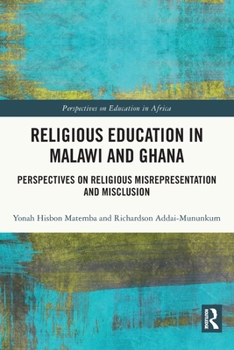Religious Education in Malawi and Ghana: Perspectives on Religious Misrepresentation and Misclusion
Religious Education in Malawi and Ghana contributes to the literature on opportunities and complexities of inclusive approaches to Religious Education (RE). It analyses how RE in Malawi and Ghana engages with religious pluralisation and provides a compelling case for the need to re-evaluate current approaches in the conceptualisation, curriculum design and delivery of RE in schools in Malawi and Ghana.
The book explains how a pervasive tradition of selection involving exclusion and inclusion of religion in RE leads to misrepresentation, and in turn to misclusion of non-normative religions, where religion is included but marginalized and misrepresented. The book contributes to wider discourse of RE on opportunities as well as complexities of post-confessional approaches, including the need for RE to avoid perpetuating the continued legitimisation of selected religions, and in the process the delegitimization of the religious 'other' as a consequence of misrepresentation and misclusion. Inspired by Braten's methodology for comparative studies in RE, the book draws on two qualitative studies from Malawi and Ghana to highlight the pervasive problems of religious misclusion in RE.
This book will be of great interest for academics, scholars and post graduate students in the fields of RE, African education, educational policy, international education and comparative education..





